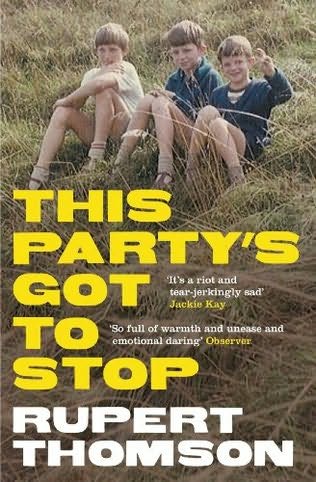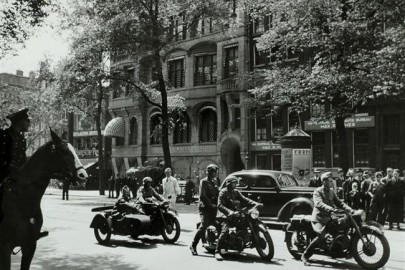This month’s Dabbler Book Club selection was Rupert Thomson’s This Party’s Got To Stop. Tomorrow we have an exclusive Q&A with the author, but today Dabbler editors Gaw and Brit provide their reviews…
Gaw
One of the good things about book clubs is that you read and end up enjoying books you would never have chosen. A memoir concerned with the death of parents? Not my thing, I’m afraid. But when Rupert Thomson’s This Party’s Got To Stop was chosen as our next Dabbler Book Club selection, what could I do?
I took it and I read it and I’m glad I did. Nige remarked in a recent post that detachment, ‘the cool, still centre’, is the sign of the true artist. It’s Thomson’s detached, cool artistry that turns something that could have been mawkish, sentimental and rather boringly upsetting into a profound, beautiful and, for me at least, revelatory book.
It’s artfully constructed, having a number of timelines interwoven so that understanding is gradually established. We feel we’re learning alongside the author as he conducts a carefully forensic exploration of what really happened to him and his family. There are no spoon-fed answers, it’s suggestive rather than conclusive. As such it succeeds in being a deeply absorbing book, one that makes you think.
The writing is remarkably evocative, often employing descriptions that manage to be both fresh and familiar. He’s especially good on smells, those repositories of memory. They lend remembered incidents particularity and credence: “the air smells earthy yet metallic, like the sharp end of a spade”.
And, yes, it is concerned with death in general and those of Thomson’s parents – especially his mother’s, who died when he was a boy – in particular. It’s both interesting and moving about death and its effects. But I think it also affords an insight into what JG Ballard described as ‘the kindness of women‘, or, more properly, what can happen in its absence (the parallels with Ballard’s writing don’t end there, something I mean as very high praise).
“This party’s got to stop”, the book’s title, is the order of a policeman, interrupting the author and his two brothers destroying with axes and piling onto a bonfire their dead father’s furniture prior to his house being sold (they’d failed to dispose of it in more conventional ways and it seemed a good idea earlier in the evening). It’s late, they’re drunk, the music’s loud, the garden’s blackened, the neighbours are terrified – three testosterone-fuelled young men doing what those type of creatures can do when let loose. A sort of Lord of the Filing Cabinets.
This incident, echoed as it is in the title, seems emblematic. And it’s surely no accident that Thomson arrives at some sort of resolution of his various issues only once he’s settled down. The kindness of women civilises and softens. In the words of the song, the world’s ‘nothing, nothing without a woman or a girl…[man]’s lost in the wilderness, he’s lost in bitterness’. It’s certainly not an original revelation. But it’s disclosed so subtly, so integrally, that one feels it afresh, and with a sort of shock of recognition.
Rupert Thomson has written an accomplished memoir of what the deaths of his parents signified for him, of what death can be. This short but intense book also contains one of the best dissections of maleness I’ve ever read.
***
Brit:
Like Gaw, I wouldn’t normally pick up a memoir in a bookshop, especially one that’s described on the cover as ‘tear-jerkingly sad’, simply because I don’t enjoy having my tears jerked. I found that blasted John Lewis ad in which Billy Joel’s She’s Always a Woman plays over the fastforwarded life of someone’s daughter almost unbearably cruel, for example. But also like Gaw, I’m very glad I did read This Party’s Got to Stop – Rupert Thomson’s tale of dysfunctional brothers and fathers – because it is a perfectly-formed gem of a book which had the rare effect of changing, at least temporarily, the way I think about emotionally important but suppressed matters.
Not that This Party should be feared as a heavy read. Thomson is funny and writes with a sureness and lightness of touch that carries you along as rapidly as any thriller. The chopped up timelines keep you interested, and the author has a very effective trick of causally dropping into the flow little unexpected bombshells (a homosexual schoolboy fling, a sudden act of violence in an Eastbourne nightclub which, counter-intuitively, brings two of the brothers closer together). These jolts, delivered deadpan, create a curious sense of unease, suggesting that the author is being both brutally honest and calculatingly selective in his revelations.
There are moments of dazzling insight. Take this, for example, when Rupert and his youngest brother Ralph are reunited after decades of estrangement:
Something hallucinogenic was happening: whenever I took my eyes off Ralph, I found that I couldn’t remember what he looked like, and even if I stared at him, his face would alter, reverting to how it had been when he was nine or ten, a time when I had known him well… I tried to home in on certain specific features — the creases on his forehead, the deep-set eyes, the humorous mouth – but my brain seemed reluctant to retain or even to process the updated image.
That passage surfaced in my consciousness at a recent family funeral, when I met cousins with whom I was very close as a child but have barely glimpsed in 25 years. This, for me, is what the book is really about, even more than the reflections on parenthood and the state of becoming orphaned. It is about that toxic combination of pride, shyness, laziness and busyness that causes cousins and friends and even brothers to drift apart, as negligible grievances become self-justifying excuses for inertia; and all the while Time does its damage.
***
What did you think of it?
You can post their reviews and thoughts in the comments below. Meanwhile, Dabbler Book Club member Sheila Woodward writes:
This was an excellent and very thought provoking book. You could really see into the lives of the three brothers – all so different. I was almost living their lives with them. Thank you for giving me the opportunity to read it.
You can buy This Party’s Got To Stop from Amazon here. The next Dabbler Book Club choice will be announced tomorrow, and we have plenty more giveaways and competitions coming up. If you haven’t already done so, join up now – it’s free.











Goes to show thatr you shouldn’t judge a book by it’s cover…Feeling miffed I didn’t apply to read this one now! Excellent reviews chaps (and Sheila)
‘Lord of the Filing Cabinets’, very clever Gaw! But the ‘chopped up timelines’ had me a little confused at times, Brit – life played out at fast forward speed with the rewind button pressed at curious, random intervals (though my own dipping in out didn’t help). With the plethora of dysfunctional family members and casual acquaintances, I felt a bit overdosed on characters too…
Yes, this memoir has an overwhelmingly masculine voice. The sense of poignancy and the dignity of death are jarred by cringe-worthy, uninhibited adolescent style behaviour – some of it utterly revolting, but I appreciate the book has a broader message.
Thomson’s work is a curiously fascinating study of human relationships, responsibilities, family structures and sibling rivalry – overshadowed by the ultimate ignominity of death. I found myself following a prevailing theme of people being locked in (or out) by fear and misunderstanding – of their emotions being blocked, and eventually (getting somewhere near to) being unlocked. There’s also the cruel etiquette of death, where the ex-wife of the deceased isn’t informed about the burial – yet the family remembers to buy a bottle of Harvey’s Bristol Cream.
Man’s wild side is something we’re unable to escape from in this book. Or in this life. Against the backdrop of attempts to maintain order, it’s Thomson’s ‘eternally youthful’ dead mother who comes nearest to being virginal.
I second both Brit and Gaw. It was a very well written and thoughtful book. You felt that here was a man examining his life for the first time. Well, better late than never.
However, I did feel a creeping unease – in a Julie Myerson sort of way – at the utilisation of his family’s and friend’s lives for the purpose of creating what, in the end, is only a book. I’m not sure what his relationship with Ralph and his unflatteringly portrayed wife is like post-publication, but I can’t believe it has improved. It’s bad enough that novelists use only partially disguised versions of those they know to populate their novels, but, like a lady newspaper columnist, he is dredging the stuff of his relations life for copy.
I might be ridiculously old fashioned in this regard, but family is important: a damn sight more important than a book, even a great one, and this isn’t great, merely good.
I asked Rupert Thomson that very question about Ralph – he answers it in tomorrow’s Q&A, Recusant.
Must read that book, the internal wiring of the family unit generates large amounts of intellectual pasture as your joint and several review and Susan’s comments illustrate and none more so at funeral time. Having attended a good number of these often surreal events I have found them fascinating, often the only occasion when true colours are flown.
It is about that toxic combination of pride, shyness, laziness and busyness that causes cousins and friends and even brothers to drift apart, as negligible grievances become self-justifying excuses for inertia; and all the while Time does its damage.
Keep up the good work boys and girls, the DIt is about that toxic combination of pride, shyness, laziness and busyness that causes cousins and friends and even brothers to drift apart, as negligible grievances become self-justifying excuses for inertia; and all the while Time does its damage.abblers grow in sture every day and in every way.
I shall now finish the comment that the website decided to scramble and publish before its logical conclusion.
Keep up the good work boys and girls, the Dabblers grow in stature every day and in every way.
You must however pay the wonks invoice upon receipt, not sixty days after, they have ways and means.
I first read some of This Party’s Got To Stop as an extract in the paper about a year ago, so was pleased to get one in the D book club draw [beginner’s luck…?] and I ripped through it. Agree wholeheartedly about the lightness of touch, and almost everything said.
There is a brilliant strangeness to it, too. Thompson seems almost flippant about the admission that i] his brother ralph thought that rupert might want to kill him, and ii] that ralph thought about killing Rupert. This was odd, and bizarre and hung around after the book was gone. How seriously is it supposed to be taken?
For reasons certainly unfathomable and probably silly, this title is available to UK Dabblers only.